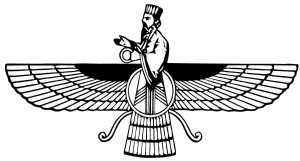Zoroastrianism and sexual orientation
Sexual orientation in Zoroastrianism is, as in many other religions, a controversial topic with differing consensus over time.
| Part of a series on |
| Zoroastrianism |
|---|
 |
|
|
Homosexuality in scripture
The most sacred scripture of Zoroastrianism is called the Avesta. The oldest portion of the Avesta are the writings of Zarathustra himself and called the Gathas.[1] The Gathas do not explicitly condemn homosexual acts, although the Südgar Nask commentary on the Gathas dislikes sodomy.
Traditionalist Zoroastrians believe that the Vendidad, one of the books of the Avesta, is an inherent part of Zoroastrian oral tradition even though it was compiled far later than the other parts of the Avesta.[2][3][4]
The man that lies with mankind as man lies with womankind, or as woman lies with mankind, is a man that is a Daeva [demon]; this man is a worshipper of the Daevas, a male paramour of the Daevas[5][6]
This passage has been interpreted to mean that homosexuality is a form of demon worship, and thus sinful. Ancient commentary on this passage suggests that those engaging in sodomy could be killed without permission from the Dastur, the high priest.[6]
Zoroastrianism has been said to have a "hatred of male anal intercourse" that is reflected in at least one mythological tale. When Ahriman, the "Spirit of Aridity and Death" and "Lord of Lies", sought to destroy the world, he engaged in self-sodomy. That caused an "explosion of evil power" and resulted in the birth of a host of evil minions.[7]
Apart from the Vendidad, the Pahlavi scriptures, later religious Persian books considered sacred by many Zoroastrians, also strongly forbid sodomy.[8]
References
- Lendering, Jona. "Avesta". livius.org. Retrieved 3 January 2015.
- Ervad Behramshah Hormusji Bharda (1990). "The Importance of Vendidad in the Zarathushti Religion". tenets.zoroastrianism.com. Retrieved 3 January 2015.
- Ervad Marzban Hathiram. "Significance and Philosophy of the Vendidad" (PDF). frashogard.com. Retrieved 3 January 2015.
- "Ranghaya, Sixteenth Vendidad Nation & Western Aryan Lands". heritageinstitute.com. Heritage Institute. Retrieved 3 January 2015.
- Jones, Lesley-Ann (13 October 2011). Freddie Mercury: The Definitive Biography: The Definitive Biography. Hachette UK, 2011. p. 28. ISBN 9781444733709. Retrieved 3 January 2015.
In the sacred Zoroastrian text[,] the Vendidad, it is stated: 'The man that lies with mankind as man lies with womankind, or as woman lies with mankind, is a man that is a Daeva (demon): this man is a worshipper of the Daevas, a male paramour of the Daevas
- Darmesteter, James (1898). "Vd 8:32". Sacred Books of the East (American ed.). Retrieved 3 January 2015.
Ahura Mazda answered: 'The man that lies with mankind as man lies with womankind, or as woman lies with mankind, is the man that is a Daeva; this one is the man that is a worshipper of the Daevas, that is a male paramour of the Daevas, that is a female paramour of the Daevas, that is a wife to the Daeva; this is the man that is as bad as a Daeva, that is in his whole being a Daeva; this is the man that is a Daeva before he dies, and becomes one of the unseen Daevas after death: so is he, whether he has lain with mankind as mankind, or as womankind. The guilty may be killed by any one, without an order from the Dastur (see § 74 n.), and by this execution an ordinary capital crime may be redeemed.
- Long, p. 68
- "HOMOSEXUALITY i. IN ZOROASTRIANISM". iranicaonline.org. Encyclopaedia Iranica. 15 December 2004. Retrieved 3 January 2015.
Sources
- Long, Ronald Edwin (2004). Men, homosexuality, and the Gods: an exploration into the religious significance of male homosexuality in world perspective. Haworth Press. ISBN 978-1-56023-152-3.